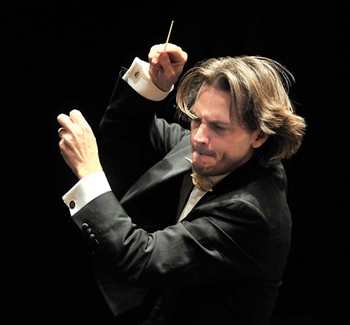by Jarrett Hoffman

On Saturday, November 11 at 7:30 pm at Plymouth Church in Shaker Heights, BlueWater Chamber Orchestra’s “Lush Autumn Musings” brings together guest conductor Daniel Meyer and soprano Laura Pedersen in Samuel Barber’s Knoxville: Summer of 1915, bookended by Maurice Ravel’s Le Tombeau de Couperin and Franz Schubert’s Symphony No. 2 in B-flat.
The program will be repeated on Sunday, November 12 at 4:00 pm at Pilgrim Church, that time with free admission.
Set to James Agee’s prose poem of the same name, Knoxville: Summer of 1915 explores the writer’s memories of his hometown, while Ravel dedicated the movements of Tombeau to friends who died in World War I. Does that nostalgic thread run through the Schubert as well?
“For me there’s personal nostalgia because I lived in Vienna for a year and a half and became very fond of Schubert,” said Meyer, who studied conducting at the Hochschule für Musik as a Rotary Ambassadorial Scholar. “I attended just about anything I could with his music, whether it was song recitals with Thomas Hampson or Concentus Musicus under Nikolaus Harnoncourt, which were my favorite concerts there.” Personal connections also link Barber’s Knoxville to Meyer, who got his professional start with the Knoxville Symphony and lived in that city for several years.
Meyer talked about Barber’s interest in all of the arts, including poetry and painting. “I think his trips to Italy were just as much about soaking up the culture as about having a chance to be unbridled and write whatever he wanted. Of course that was before Knoxville, but it was indicative of the fact that he was so attuned to the other arts beyond music. It makes a lot of sense that he could read a poem and immediately formulate some melodic ideas. His Agee setting is a lovely work, and it beautifully depicts the essence of the text.”
Does that text factor into Meyer’s own interpretation? “I try to unpack the piece as if I had written it,” he said. “Obviously Barber started with the text, so why wouldn’t I do the same? Read it, get a feel for its rhythms, its natural ebb and flow, absorb the images — and then start to discern how and why Barber made the decisions he did about each of those lines of poetry.”
A Cleveland native, Meyer was raised in Medina County and graduated from Padua Franciscan High School. Trained from an early age as a pianist and a violinist, he “did everything musical” that he could. “I was even a member of the Singing Angels when I was a little kid — so Cleveland music-making is deeply imbedded into my psyche.”
His Ohio education extends to degrees from Denison University and the University of Cincinnati College-Conservatory of Music. And considering his post in Erie, as well as his time as Resident Conductor of the Pittsburgh Symphony, Meyer has spent a lot of time in the Rust Belt.
“I learned to deal with disappointment at a very early age,” he said with a laugh, “with the Cleveland Browns and the Indians.” This brought up a key difference with a nearby Rust Belt city. “It was a real shock to move to Pittsburgh, where you’d watch television and hear the sports shows, and the way they talked, you would think the team had just lost — but they had actually won, and they were making a march to the Super Bowl.”
Regarding the Rust Belt in general, Meyer called its people enormously warm-hearted, friendly, and caring. “Yet there is a little bit of a grit and toughness,” he said, “and I think it has to do with the gray days and the industrial history of these cities. There’s this real work ethic that comes with living around here.
“All of that certainly resonates with me and actually makes for great music-making, which helps explain why Cleveland, Erie, Pittsburgh, and Buffalo have amazing orchestras. These are communities that have believed in their musical institutions and supported them. And the musicians make them their focus: they’re not distracted, they really believe that this is their life’s work and want to give their best every time they take the stage. That’s the kind of spirit I’m looking forward to with the BlueWater musicians — and frankly with any orchestra I work with in this part of the world.”
Published on ClevelandClassical.com November 6, 2017.
Click here for a printable copy of this article



